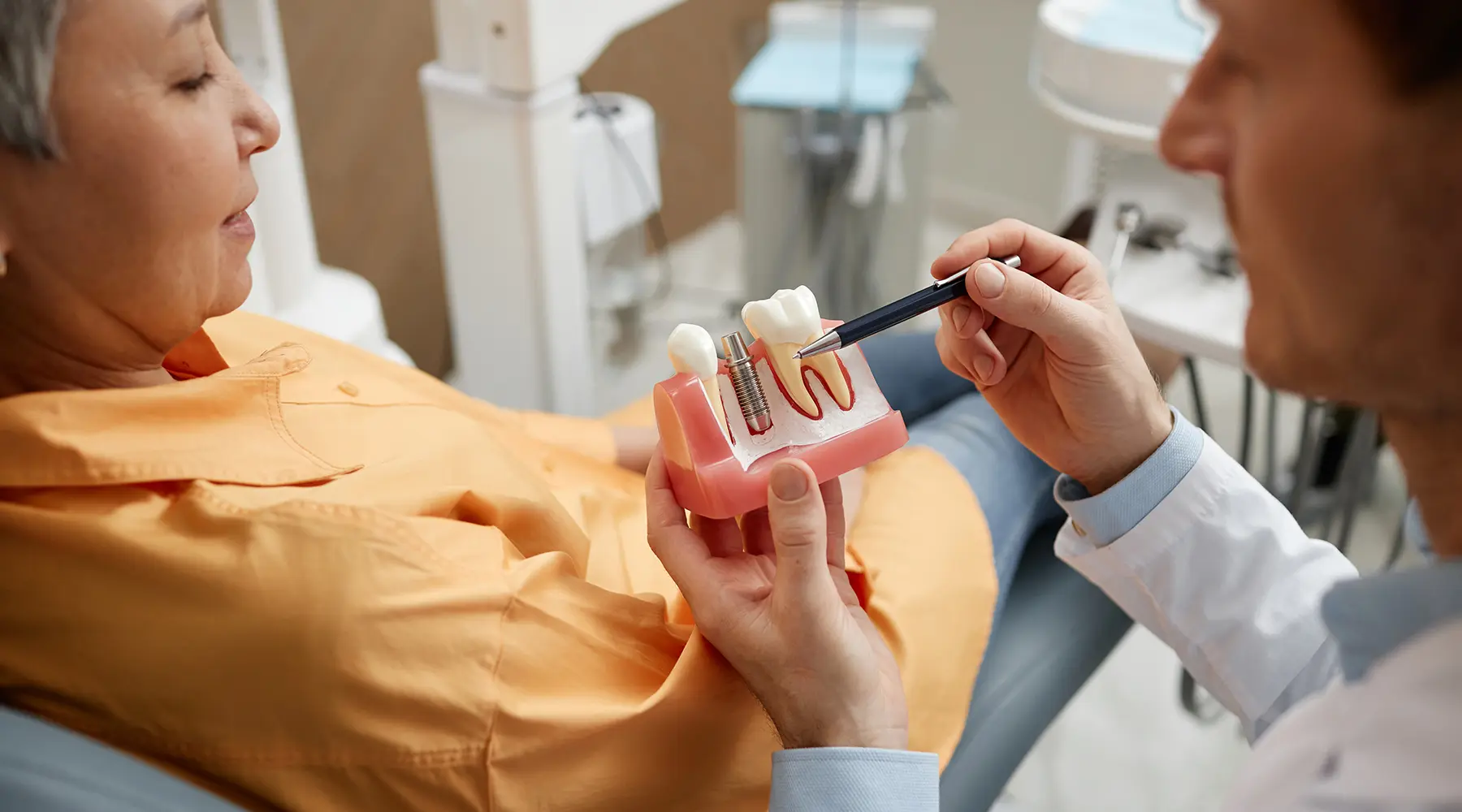Reviewed By Dr. Tyler N Davis, DMD
Reading Time: 4 minutes
Missing teeth can affect how you eat, speak, and feel about your smile. Fortunately, modern dentistry offers reliable ways to restore both function and appearance. Dental implants and dentures are two proven options, each with unique benefits depending on your needs and lifestyle.
Table of Contents
Dentures: Fast and Affordable Tooth Replacement
Dentures are one of the most common options for replacing missing teeth. They restore appearance and function without surgery, making them a good choice for patients who want a quick, non-invasive solution.
A custom acrylic base with artificial teeth sits on the gums to recreate a natural smile. Full dentures replace all teeth in an arch, while partial dentures fill smaller gaps by attaching to nearby natural teeth.
Pros of Dentures
Dentures offer several practical advantages for restoring your smile quickly and affordably.
- Lower upfront cost: An affordable starting point for replacing multiple missing teeth.
- No surgery needed: Ideal for patients with health restrictions or those who prefer a simpler process.
- Quick results: Complete dentures can be made in just a few weeks.
- Easy to adjust: Repairs, relines, and replacements are straightforward.
Cons of Dentures
While dentures are effective and accessible, they do have some limitations to consider.
- Can move or slip: Adhesives may be needed for stability during eating or speaking.
- Limited bite strength: Hard or sticky foods are often difficult to manage or off limits.
- Gradual bone loss: Because dentures do not stimulate the jawbone, the bone slowly shrinks over time.
- Daily maintenance: Must be removed, cleaned, and soaked every day.
Dental Implants: Permanent, Stable, and Natural-Looking
Dental implants are a long-term solution for replacing missing teeth. They act as artificial roots that anchor directly into the jawbone, creating a permanent foundation for a permanent or removable denture.
Pros of Dental Implants
Dental implants offer lasting comfort, strength, and appearance that closely mimic natural teeth.
- Stable and secure: No slipping or clicking; they feel like real teeth.
- Preserve bone structure: Prevent bone loss by stimulating the jawbone.
- Natural look and feel: Designed to blend seamlessly with surrounding teeth.
- Long-lasting: With proper care, implants can last for decades.
- Freedom to eat anything: Restores full chewing power for all types of food.
Cons of Dental Implants
Although highly effective, implants may not be the right choice for everyone.
- Higher initial cost: A greater investment upfront compared to dentures.
- Surgical placement required: Involves a minor surgical procedure and healing period.
- Longer process: Treatment can take several months from start to finish.
- Bone health required: May need bone grafting if the jaw lacks sufficient density.
Comparison Table: Dental Implants vs. Dentures
Both traditional dentures and implant-supported dentures replace missing teeth, but they differ in stability, comfort, and long-term value. The table below highlights the main differences to help you choose the best fit for your needs..
| Feature | Dentures | Dental Implants |
| Stability | May shift or need adhesive. | Securely anchored to dental implants for a firm fit. |
| Comfort | Can cause sore spots at first. | Feels natural and comfortable. |
| Bite strength | Limited; softer foods are easier to eat. | Strong bite function, closer to natural teeth. |
| Appearance | Natural look but may loosen with time. | Seamless, natural-looking, and stays in place. |
| Longevity | 5–10 years before replacement. | Can last many years with proper care and maintenance. |
| Bone preservation | Does not prevent bone loss. | Helps maintain bone density by stimulating the jaw. |
| Cleaning | Must be removed and soaked daily. | Cleaned like natural teeth or easily removed for cleaning, depending on the type. |
| Timeline | Ready within weeks. | Requires implant placement and healing before attachment. |
| Upfront cost | Lower initial expense. | Higher initial cost but greater long-term value. |
| Ideal for | Quick, non-surgical replacement. | Long-term, stable solution for a natural look and feel. |
Your Next Step Toward a Complete Smile
If you are exploring tooth replacement options, we invite you to schedule a consultation with Dr. Tyler N. Davis. Our team will help you decide whether traditional dentures or implant-supported dentures are the right fit for your smile.
When implant surgery is needed, we coordinate your care with trusted oral surgeons and periodontists to ensure a seamless process from placement to your final restoration.
We are always accepting new patients! If you are in the Phoenix East Valley, book an appointment at our dental office in Mesa, AZ. Call (480) 664-1438 or visit us at 2500 South Power Road, Suite 102, Mesa, AZ.
FAQs
Is it better to get dental implants or dentures?
The best choice depends on your goals and oral health. Dental implants feel more natural, last longer, and preserve bone, while dentures offer a quick, non-surgical fix at a lower cost.
What is the fail rate of dental implants?
Dental implants have a high success rate, around 90% when placed by an experienced provider and cared for properly. Good hygiene, bone health, and regular dental visits keep that success rate strong.
Am I a good candidate for dental implants?
You’re a good candidate if you have healthy gums, enough bone density, and no uncontrolled medical conditions. Even with some bone loss, grafting procedures can make implants possible.

